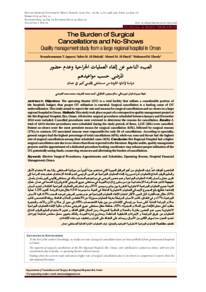Document
The Burden of surgical cancellations and no-shows : quality management study from a large regional hospital in Oman.
Identifier
DOI: 10.18295/squmj.2016.16.03.006
Contributors
Other titles
.العبء الناجم عن إلغاء العمليات الجراحية وعدم حضور المرضى حسب مواعيدهم
Publisher
Sultan Qaboos University.
Gregorian
2016-08
Language
English
English abstract
Objectives: The operating theatre (OT) is a vital facility that utilises a considerable portion of the hospital's budget; thus proper OT utilisation is essential. Surgical cancellation is a leading cause of OT underutilisation. This study aimed to report the rate and reasons for surgical cancellations and no-shows in a large regional hospital in Oman. Methods: This study took place as part of a retrospective quality management project at the Ibri Regional Hospital, Ibri, Oman. All elective surgical procedures scheduled between January and December 2014 were included. Cancelled procedures were reviewed to determine the reasons for cancellation. Results: A total of 4,814 elective procedures were scheduled during the study period; of these, 1,235 (26%) were cancelled. Patient no-shows were the most prevalent reason for surgical cancellation (63%), followed by surgical reasons (17%); in contrast, OT-associated reasons were responsible for only 2% of cancellations. According to speciality, general surgery had the highest percentage of total cancellations (65%), while ear, nose and throat had the highest rate of surgical cancellations among their scheduled cases (42%). Conclusion: Ibri Regional Hospital had a higher surgical cancellation rate due to no-shows than those reported in the literature. Regular audits, quality management projects and the appointment of a dedicated procedure booking coordinator may enhance proper utilisation of the OT, potentially saving funds, conserving resources and alleviating the burden of cancellations.
Member of
ISSN
2075-051X
Resource URL
Arabic abstract
الأهداف: غرفة العمليات (OT) هي منشأة حيوية تستخدم جزءًا كبيرًا من ميزانية المستشفى. وبالتالي فإن الاستخدام السليم لـ OT أمر ضروري. يعد الإلغاء الجراحي سببًا رئيسيًا لعدم استخدام OT. تهدف هذه الدراسة إلى الإبلاغ عن معدل وأسباب الإلغاء الجراحي وعدم الحضور في مستشفى إقليمي كبير في عمان. الطرق: أجريت هذه الدراسة كجزء من مشروع إدارة الجودة بأثر رجعي في مستشفى عبري الإقليمي، عبري، عمان. تم تضمين جميع العمليات الجراحية الاختيارية المقررة بين يناير وديسمبر 2014. وتمت مراجعة الإجراءات الملغاة لتحديد أسباب الإلغاء. النتائج: تمت جدولة ما مجموعه 4814 إجراءات اختيارية خلال فترة الدراسة؛ تم إلغاء 1235 منها (26٪). كان عدم حضور المرضى هو السبب الأكثر شيوعًا للإلغاء الجراحي (63%)، تليها الأسباب الجراحية (17%)؛ في المقابل، كانت الأسباب المرتبطة بـ OT مسؤولة عن 2% فقط من حالات الإلغاء. وبحسب التخصص، سجلت الجراحة العامة أعلى نسبة من إجمالي حالات الإلغاء (65%)، في حين سجلت أمراض الأذن والأنف والحنجرة أعلى نسبة من حالات الإلغاء الجراحية بين الحالات المجدولة (42%). الاستنتاج: كان لدى مستشفى عبري الإقليمي معدل إلغاء عمليات جراحية أعلى بسبب عدم الحضور مقارنة بتلك المذكورة في الأدبيات. قد تؤدي عمليات التدقيق المنتظمة ومشاريع إدارة الجودة وتعيين منسق مخصص لحجز الإجراءات إلى تعزيز الاستخدام السليم لـ OT، مما قد يؤدي إلى توفير الأموال والحفاظ على الموارد وتخفيف عبء الإلغاءات.
Category
Journal articles

